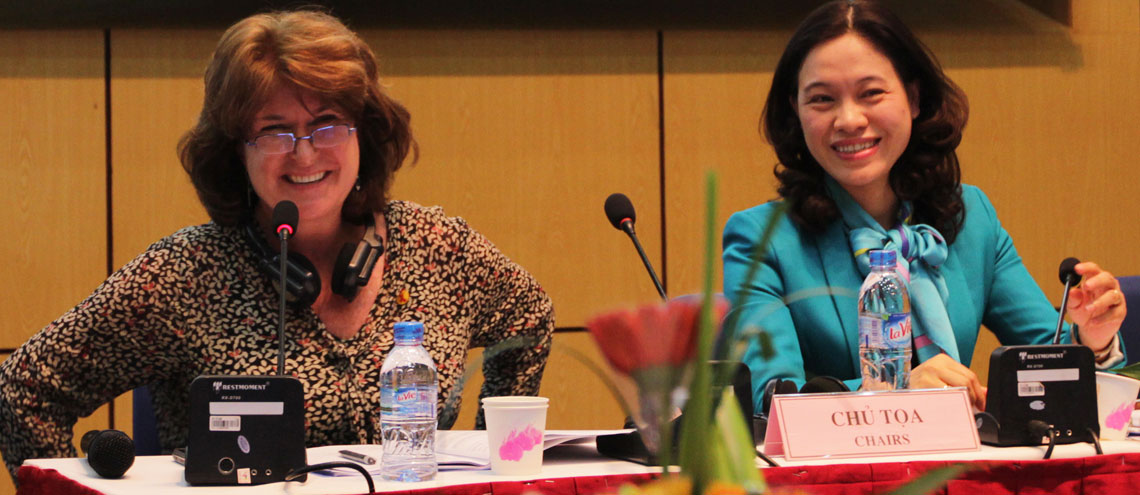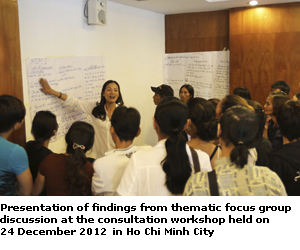People living with and at risk of HIV call for stigma- and discrimination-free world for all
Ngoc Bao was born male, but she lives her life as a woman. Her family rejected her decision to live openly as a transgender. She left her home and struggled to find steady work, so she sometimes sold sex to make ends meet, and to save money to realize her dream of sex reassignment surgery.
Ngoc Bao is among 80 community members—including people living with HIV (PLHIV), drug users, sex workers, and men who have sex with men—who came together in December 2012 in Ho Chi Minh City to develop a common vision of a future world that accepts them and ensures they have equal access to health, education and employment. The consultation was one of many organized in Viet Nam as part of the global discussion on the post-2015 development agenda, supported by the UN.
Ngoc Bao left sex work in early 2012, and she now works as a peer educator to disseminate HIV prevention information and condoms to sex workers. For Ngoc Bao, the future should be a world where men who have sex with men are socially accepted. They should be able to access sexual and reproductive health and HIV services and have equal job opportunities.
Others at the consultation stressed the need to ensure that HIV treatment—now mostly funded by foreign donors—remains affordable in Viet Nam, even for those living near the poverty line.
“I want to be able to stay on antiretroviral treatment as long as I need to,” said Mai, a woman living with HIV and tuberculosis. Mai’s husband was infected with HIV while injecting drugs, and he died of AIDS in 2011. Mai has been on fully subsidised treatment since early 2012. Although the HIV treatment is free, many other health services are not. Mai stressed that she is one of many poor people living with HIV who struggle to earn enough money to pay for the transportation costs of their healthcare, and for the treatment of opportunistic infections such as Hepatitis C.
Thanh, a member of a self-help group for people who inject drugs, has been on methadone maintenance therapy since late 2010. His hope for the future is that this treatment programme will be quickly scaled up, and that discrimination against women who inject drugs will be reduced so they can access information about drug dependence treatment and enrol in the methadone programme more easily.
Consultation findings
People living with HIV and groups at higher risk of HIV infection were identified as one of the eight groups for the post-2015 consultation process in Viet Nam. UNAIDS, UNODC and UN Women worked with local NGOs, self-help groups and community networks to organize three consultation workshops with people living with HIV, drug users, sex workers and LGBT (lesbian, gay, bi-sexual and transgender people). UN Women also worked to ensure that all consultations addressed gender issues.
The consultations raised a wide array of issues that people living with HIV, drug users, sex workers and LGBT people wish to improve or realise after 2015 so they can fully enjoy their rights under Vietnamese and international law, and live equally alongside all people in Viet Nam. Of common interest were various aspirations such as:
– good information on health related risks;
– easy access to comprehensive, good quality, professional and affordable health care services;
– better availability of diversified drug dependence treatment that is voluntary and evidence-based across the country;
– support on vocational training, skill enhancement and job placement for stable employment and livelihoods;
– no stigma and discrimination in their families or at school;
– entitlement to have children and be supported and protected to have HIV-free children;
– greater say on the issues that affect their lives; and
– better social protection
Stigma and discrimination
“One big lingering challenge for Viet Nam is stigma and discrimination against people living with HIV and people at higher risk of HIV infection,” said Huynh Lan Phuong, UNAIDS Programme Officer on Key Populations, who supported the consultation workshop in Ho Chi Minh City. “Work needs to continue and intensify beyond 2015 to eliminate social stigma related to HIV, so Viet Nam can firmly progress towards the global goal of Zero Discrimination.”
Underlying the seriousness and harms caused by stigma against LGBT people, Ms. Suzette Mitchell, Country Representative of UN Women, who chaired the November 2012 consultation workshop for LGBT people, called for Viet Nam to prohibit discrimination on the grounds of sexual orientation and gender identity. Removal of the currently prevailing stereotypes and prejudices against LGBT persons will make a more equal and better world for all, she emphasized.
“A better world is one where every person can enjoy the same rights, including drug users,” expressed Duong Hai Nhu, UNODC HIV Programme Officer, echoing the wish for a more equal world by many at the consultation in January 2013 with drug users coming from Southern and Central Highland provinces. “Drug users need treatment, not punishment. They need more evidence-based and voluntary treatment, as well as better social support services.”
What’s next?
Findings from the consultations have been synthesized into one consultation report for the group of people living with HIV, drug users, sex workers and LGBT people, which will ultimately be incorporated in the country report on the overall findings from the post-2015 consultations in Viet Nam.
*Note: Names of community people mentioned in the story are not their real names





